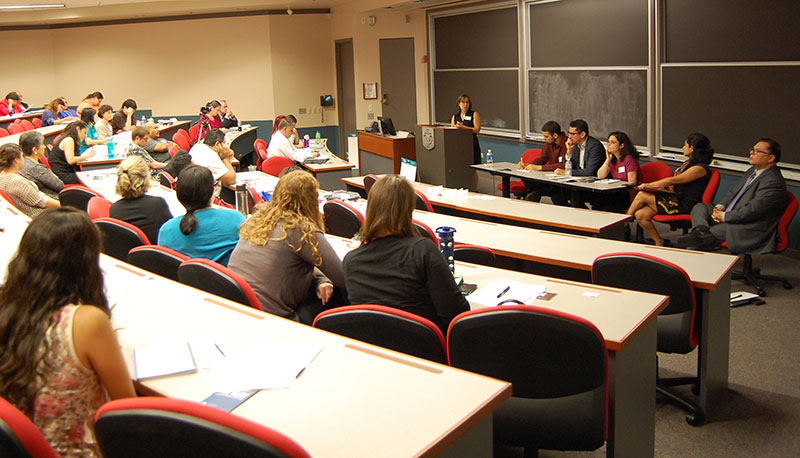In light of proposed changes to immigration law, DePaul College of Law’s Asylum and Immigration Law Clinic hosted a conference focused on building the capacity of Illinois community-based organizations to provide legal information and legal representation to low-income immigrants and refugees.
The "Smart Growth/Capacity Building" conference on July 22 and 23 garnered the interest of more than 100 attendees from 21 Illinois community-based immigration service providers, along with representatives from 15 nationally recognized immigrant advocate organizations. Attendees also included representatives from the City of Chicago’s New Americans Office, Office of Governor Pat Quinn, U.S. Citizenship and Immigration Services, and the Mexican and Guatemalan Consulates. The conference provided participants with updates on legislation, tools and strategies for increasing capacity and improving efficiencies in providing legal services, and workshop opportunities for community-based organization staff to examine their preparedness for responding to client and caseload demands.
 Interagency cooperation panel discusses steps to meet unprecedented legal service demands. Panelists, from left: Rebecca Carson, Formerly Chief of Staff, U.S. Citizenship and Immigration Services; Abdelnasser Rashid, Illinois Coalition for Immigrant Refugee Rights; Adolfo Hernandez, City of Chicago; Amy Stern, U.S. Citizenship and Immigration Services; Amalia Rioja, Office of Governor Pat Quinn; and Jorge L. Hidalgo, Consulate General of Mexico.Response to the conference—from foundations, to public servants to legal advocates—was overwhelmingly positive. Conference participants cited the Asylum and Immigration Law Clinic as a reliable resource for training, support and information dissemination among immigrant legal service providers.
Interagency cooperation panel discusses steps to meet unprecedented legal service demands. Panelists, from left: Rebecca Carson, Formerly Chief of Staff, U.S. Citizenship and Immigration Services; Abdelnasser Rashid, Illinois Coalition for Immigrant Refugee Rights; Adolfo Hernandez, City of Chicago; Amy Stern, U.S. Citizenship and Immigration Services; Amalia Rioja, Office of Governor Pat Quinn; and Jorge L. Hidalgo, Consulate General of Mexico.Response to the conference—from foundations, to public servants to legal advocates—was overwhelmingly positive. Conference participants cited the Asylum and Immigration Law Clinic as a reliable resource for training, support and information dissemination among immigrant legal service providers.Following the conference, the clinic continues to respond to consultation requests from community-based organizations prioritizing improvements to internal structures in order to better serve the needs of low-income immigrants, and the Asylum and Immigration Law Clinic continues to provide opportunities for collaboration and mentoring.
The conference was made possible thanks to generous funding from the MacArthur Foundation.